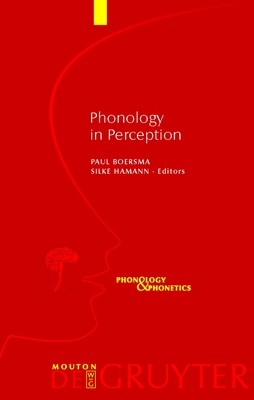
- We will send in 10–14 business days.
- Publisher: Walter de Gruyter
- ISBN-10: 3110219220
- ISBN-13: 9783110219227
- Format: 15.6 x 23.4 x 1.9 cm, hardcover
- Language: English
- SAVE -10% with code: EXTRA
Phonology in Perception (e-book) (used book) | bookbook.eu
Reviews
Description
The book consists of nine chapters dealing with the interaction of speech perception and phonology. Rather than accepting the common assumption that perceptual considerations influence phonological behaviour, the book aims to investigate the reverse direction of causation, namely the extent to which phonological knowledge guides the speech perception process.
Most of the chapters discuss formalizations of the speech perception process that involve ranked phonological constraints. Theoretical frameworks argued for are Natural Phonology, Optimality Theory, and the Neigbourhood Activation Model. The book discusses the perception of segments, stress, and intonation in the fields of loanword adaptation, second language acquisition, and sound change.
The book is of interest to phonologists, phoneticians and psycholinguists working on the phonetics-phonology interface, and to everybody who is interested in the idea that phonology is not production alone.
EXTRA 10 % discount with code: EXTRA
The promotion ends in 9d.04:14:03
The discount code is valid when purchasing from 10 €. Discounts do not stack.
- Publisher: Walter de Gruyter
- ISBN-10: 3110219220
- ISBN-13: 9783110219227
- Format: 15.6 x 23.4 x 1.9 cm, hardcover
- Language: English English
The book consists of nine chapters dealing with the interaction of speech perception and phonology. Rather than accepting the common assumption that perceptual considerations influence phonological behaviour, the book aims to investigate the reverse direction of causation, namely the extent to which phonological knowledge guides the speech perception process.
Most of the chapters discuss formalizations of the speech perception process that involve ranked phonological constraints. Theoretical frameworks argued for are Natural Phonology, Optimality Theory, and the Neigbourhood Activation Model. The book discusses the perception of segments, stress, and intonation in the fields of loanword adaptation, second language acquisition, and sound change.
The book is of interest to phonologists, phoneticians and psycholinguists working on the phonetics-phonology interface, and to everybody who is interested in the idea that phonology is not production alone.


Reviews